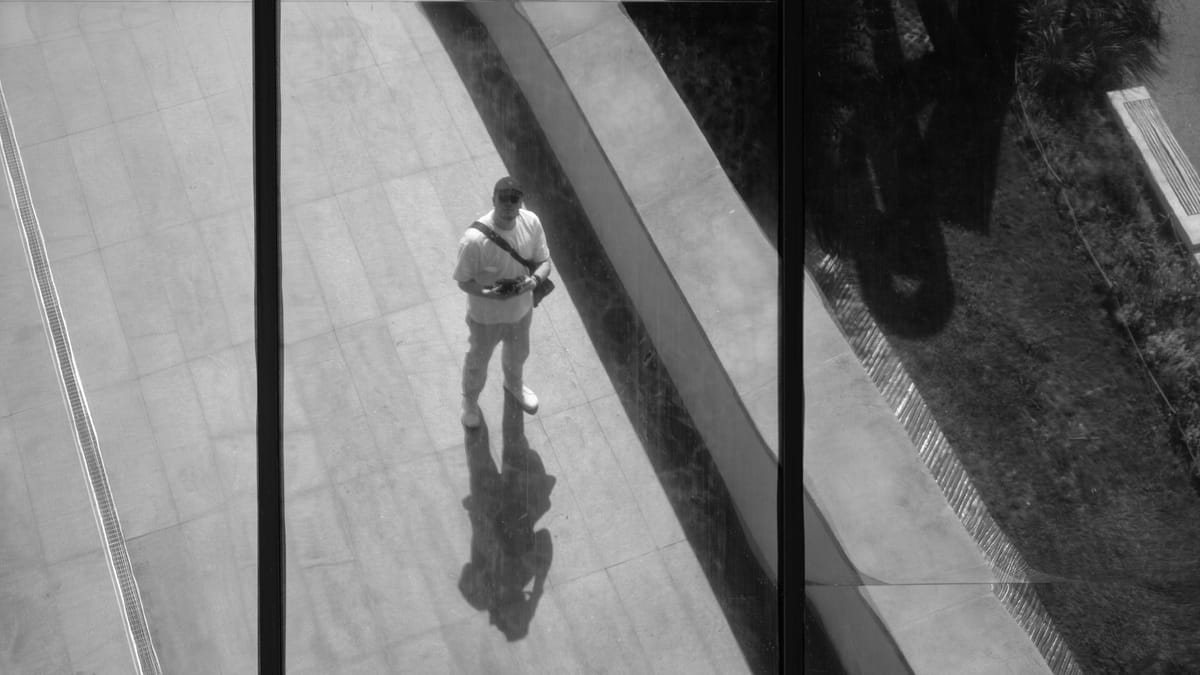Media Roundup - July 2025

As I mentioned in the last post, July is the month in which virtually every Swede goes on vacation at the same time. I am usually an exception to that rule, but this year I was forced to take two weeks off, and so I spent most of that time traveling through Central Europe (you can expect a post about that Soon™). While that did mean a lot of time reading on trains, I didn't read anything particularly inspiring, so this will be a skinnier post than normal.
Despite the relatively skint content, I am aware this post is publishing in the middle of August. I may have forgotten to start writing it—and then ended up writing way too much per entry, as per usual. Anyway, enjoy.
Reading
Errico Malatesta - At The Café
Some time ago, I realized I had no real understanding of anarchism as a political philosophy. The image in my head when I heard the word "anarchy" was a sort of Mad Max-like post-apocalypse where the absence of rules led to violence and chaos. But as I've widened my knowledge of political theory, it's become clear that claiming "anarchism is when no rules" is about as helpful as saying "communism is when no iPhone".
I think this realization came when I watched a video called "How Anarchy Works" by Andrewism, an anarchist YouTuber from Trinidad & Tobago. In the video, Andrew describes an anarchist society that sounds plausible—with structures and systems based on cooperation and respect, where they are currently largely based on coercion—even if it would require great change to realize.
More recently, I discovered Zoe Baker's YouTube channel; I haven't watched much of her content yet, but one of her videos mentioned a book written by Italian anarchist Errico Malatesta called "At the Café". Baker described the book as a good introduction to anarchist theory, so I figured I'd pick it up.
Turns out it's not the easiest thing to find a physical copy of this book in English—as far as I can tell, the publisher of the English translation doesn't ship to Sweden (although they do ship to Åland)—but you can find it in the Anarchist Library.
I started reading it on a flight to Riga that—due to a time-zone related misunderstanding on my part—turned out to be an hour shorter than I expected, so I didn't get very far. I've been reading it on and off since then, and I'm quite enjoying the dialogue format as a method for Malatesta to both present and dissect the arguments for and against anarchism. It's also quite funny; there's this quote from Prospero (Malatesta's representative for the class of wealthy capitalists) when he's arguing with Ambrogio (a policeman) that their current social order is based on the threat of violence that made me laugh out loud:
You say rights, I say force; but, then, what really counts are the blessed carabinieri, and whoever has them on their side is right.

SkillUp's New Site!
If you're into videogames, yet somehow unaware of Australian YouTuber SkillUp, then I guess you're part of today's lucky 10 000. I've been following him for years for his well-produced first impressions and reviews—he recently released a documentary-length video on Clair Obscur (that I've yet to watch)—and also for his weekly news show "This Week in Videogames". As my life has gotten busier—and I attempt to spend less time on social media—I've been less in touch with what's going on in the industry, and so TWIV has been great for keeping myself in the loop. I even had a small Pointing Leonardo moment when one of the videos (briefly) mentioned the unionization at Avalanche.
Apparently not content with hosting a great weekly news show, two weeks ago SkillUp announced thisweekinvideogames.com, an "ad-free and AI-free" news outlet, with all the same content as the videos, as well as reviews and other features.
I, for one, am stoked to see another independent news outlet that aims to provide quality output with a fair business model. If you've read a couple of these posts, it won't come as a surprise that one of my favorite websites is Aftermath, a worker-owned news outlet/blog that continues to impress me with the interesting content they put out. TWIV is similarly owned by its editorial staff, and I wish them all the best.
If there was one thing I'd wish for, it'd be for them to get a shorter URL. "thisweekinvideogames.com" is a pain in the ass to write out!
My other wish would have been for an RSS feed—the site launched without one—but that was added while I was writing this post! Hooray!
Complicated URL or not, you should still check out the site, and maybe consider becoming a supporter. I believe small, worker-owned outlets like these are critical to ensuring the health of the games media ecosystem, and they deserve all the support they can get.
Watching
PewDiePie de-Googling
If you asked me which YouTuber I thought most likely to switch to Linux—which I myself did quite recently!—and also go through a full "de-Googling" process (including self-hosting his file storage and password manager from a Steam Deck), PewDiePie would probably be near the bottom of that list. Mind you, I haven't watched any of Felix's content since his Amnesia days—which were... 13 years ago!?—so I don't really have an up-to-date idea of what his content is like, but still.
All jokes aside, I'm genuinely impressed with the work he's put in, and I appreciate that he's made two videos talking about his process; hopefully this will inspire people to make the change, and move the world closer to glorious FOSS utopia.
That is, unless the purists manage to sink their own ship by complaining about all the new Linux users who are "doing it wrong". We already saw this happen with Mastodon when Twitter imploded, and it's the reason why most people ended up going to Bluesky. If you want adoption, you need to meet people where they're at; if they don't want to go straight from Windows to immutable file systems and command prompts, ease them into it with package manager GUIs and "idiot-proof" distros.
And when one of the biggest YouTubers in the world makes videos encouraging his followers to adopt your software, take that as the gigantic win it is.
Dimension 20: Fantasy High
A long time ago, I used to watch an actual play show on YouTube called "RollPlay". I had never heard of the format before, but stumbled upon it—like many people, I imagine—through TotalBiscuit's involvement in one of the campaigns. The show introduced me to Steven Lumpkin, a game designer who DM:ed several of the shows, and who I still follow on Bluesky and occasionally wish I could grab a beer with.
I stopped watching RollPlay due to backlog fatigue, and there was some, uh... controversy that put me off really ever coming back. I spent the next several years not thinking too much about actual play shows—I was vaguely aware of Critical Role, but never checked it out—until I got a subscription to Dropout.tv.
If you're unfamiliar, Dropout is the streaming service of what used to be CollegeHumor (and if you don't know what CollegeHumor was, we're probably not the same age). Originally an ordinary corporate media company, it's now independently run by CEO and majority owner Sam Reich, who seems intent on running it as pro-socially as possible.
Dropout's content primarily consists of various unscripted comedy shows, such as Game Changer—a game show where the game changes every show—as well as some semi-scripted shows like Smartypants—a show in which comedians do silly presentations about a topic of their choosing, which is a premise I find deeply funny as someone who loves going on rants about silly or obscure things.
The service's crown jewel, however, is probably Dimension 20, an actual play D&D show hosted by Brennan Lee Mulligan. And this is the show that got me back into watching actual play.
I don't know exactly what the sauce is that makes D20 so engaging. Perhaps it's the fact that the cast are all professional comedians and actors, or Brennan's amazing DM-ing. The production value definitely helps; from the multi-camera setup that cuts between the cast and the DM, to the incredible miniature stages and characters that help bring the show to life, D20 simply feels incredible to watch.
If actual play shows seem interesting to you—or you already watch them and somehow didn't already know about Dimension 20—I highly recommend you go check this show out. You can find the first season of the very first campaign, Fantasy High—a high-fantasy take on John Hughes' movies—for free on YouTube. If you want something tonally different, I recommend the campaign Never Stop Blowing Up (although that one's not free), an amazing spoof of 90s action films that uses a modified version of the very cool Kids on Bikes RPG system.
And even if you're not into D&D or actual play shows, but you do like comedy, a Dropout subscription is criminally cheap and gives you access to a treasure trove of great comedy.
Unlearning Economics - Downton Abbey and the Origin of Capitalism
I mentioned Cahal Moran—also known as Unlearning Economics on YouTube—in last month's post. Moran makes video essays with a focus on economics, many of which run in excess of an hour. The length of the videos, combined with the academic tone—although Moran does weave in a fair bit of humor and practical commentary as well—may put some people off; I think they're great for making the subject of economics more accessible to those who do not have the time or inclination to read a bunch of economic literature (although in my case, I did get inspired to read Ha-Joon Chang's books because Moran mentioned them in a Q&A).
A few weeks ago, Moran released a video about Downton Abbey, a show I haven't watched but I'm told is very good. I wanted to watch the video because it's also about the origin of capitalism; what surprised me was that my partner seemed equally excited to watch it, because she'd binged the show while I was on vacation. A great example, if one was needed, of how media analysis can serve to make complicated academic subjects more palatable to a general audience!
I found the video fascinating; Moran, heavily referencing the book "The Origin of Capitalism" by Ellen Meiksins Wood, illustrates how capitalism's origins in the United Kingdom was not tied to industrialization or other commonly cited factors, but grew out of the very specific structure of property ownership and tenancy that was established by William the Conqueror much earlier. It's an interesting rebuttal of the idea that capitalism is some naturally occurring optimal system of managing resources; instead, it is but one of many options that can grow out of specific societal conditions, and its spread throughout the world, has less to do with its suitability and more to do with imperialist expansion.
I highly recommend watching the video for Moran's full analysis—particularly if you've watched Downton Abbey, although a familiarity with the show isn't necessary to understand the video. If you like his content, I would also recommend his videos on how free stuff is good, actually, as well as his video on worker democracy (which I plan on writing more about once I'm done with the 4-day week posts).
Playing
I'm ashamed to admit I didn't so much as touch a video game in the entire month of July. I've been thinking about playing Abiotic Factor, though 👀

